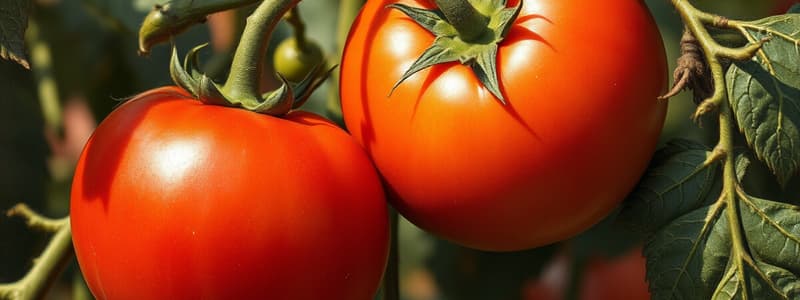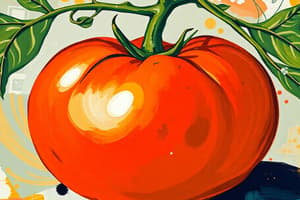Podcast
Questions and Answers
At what maturity index stage are tomato fruits harvested primarily for frying purposes?
At what maturity index stage are tomato fruits harvested primarily for frying purposes?
- Pink stage
- Turning (breaker stage)
- Immature green (correct)
- Mature green
Which maturity stage indicates that a tomato fruit is best harvested for long-distance shipment and storage?
Which maturity stage indicates that a tomato fruit is best harvested for long-distance shipment and storage?
- Over ripe stage
- Turning (breaker stage)
- Mature green (correct)
- Pink stage
What visual characteristic signals the pink stage of tomato fruit maturity?
What visual characteristic signals the pink stage of tomato fruit maturity?
- One-fourth surface showing pink color
- Light green color at blossom end
- Entire fruit showing red color
- Three-fourths surface showing pink color (correct)
When are onion bulbs considered mature?
When are onion bulbs considered mature?
What condition should pepper fruits meet at the time of harvest?
What condition should pepper fruits meet at the time of harvest?
When should okra be harvested for the best quality?
When should okra be harvested for the best quality?
What characteristic indicates that muskmelon is ready for harvest?
What characteristic indicates that muskmelon is ready for harvest?
Which sign indicates that sweet potatoes are ready to be harvested?
Which sign indicates that sweet potatoes are ready to be harvested?
At what stage should garden peas be harvested?
At what stage should garden peas be harvested?
Which criterion is essential for harvesting potatoes?
Which criterion is essential for harvesting potatoes?
Flashcards are hidden until you start studying
Study Notes
Tomato
- Immature green tomatoes are harvested for frying; seeds not fully developed.
- Mature green tomatoes are fully grown, with a brownish ring at the stem scar; harvested for long-distance shipment.
- Turning (breaker stage): One-fourth of the blossom end shows pink; harvested for local market.
- Pink stage: Three-fourths of the fruit surface is pink; also for local markets.
- Hard ripe stage: Nearly entire fruit is red or pink, flesh still firm; suitable for table use and processing.
- Over ripe stage: Fully red and soft; primarily for seed extraction as they begin to decay.
Capsicum
- Green pepper varieties should be harvested when fully mature but before ripening.
- Red and yellow varieties are harvested at initial color change.
- Fruits must be firm and crisp at harvest, avoiding tender, immature stages.
Onion
- Bulbs mature when neck tissues soften and tops decolorize.
- Indicators of maturity include a dried neck and toppled leaves, with green remaining.
Sweet Potato
- Harvest when leaves start yellowing and shedding.
- Immature tubers show dark green cut surface versus milky white for fully mature ones.
Okra
- Immature, tender fruits are picked 3 to 7 days after flowering or 3rd to 5th day from pod formation.
- Harvest when fruits are bright green with fleshy pods and small seeds.
Moringa
- Fruits should be harvested when they reach sufficient length and girth but before fiber development.
Cucumber
- Pick fruits 45 days after sowing or 8th to 10th days post-flowering for tender salad cucumbers.
Bottle Gourd
- Harvest when fruits are light green, 30-35 cm long, and tender with slight pubescence on the skin.
Muskmelon
- Harvested 60-70 days after sowing, at 'half-slip' stage for commercial sale; allows for optimal flavor.
- Full slip occurs when the pedicle separates easily; harvest before full ripeness for transport to minimize damage.
Watermelon
- Ready for consumption 30-40 days after anthesis.
- Color beneath the fruit changes from creamy white to yellow; rind hardens enough to resist thumbnail penetration.
- Sugar content reaches 10% or more in the center; immature fruits produce a metallic sound when thumped.
Garden Pea
- Early cultivars require roughly 1000 heat units to mature; late sowing cultivars need over 1600.
- Harvest pods when filled, tender, and transitioning from dark green to light green; delay can reduce sugar content.
Chilli
- Harvest when fully mature, before changing from green to red.
Potato
- Maturity indicated by yellowing and drying of haulms.
Cabbage
- Maturity determined by solidity, firmness, and squeaking of heads.
Cauliflower
- Maturity based on curd size and color; best when snow white or creamy white, surrounded by green leaves.
Knol-Khol
- Harvest when knobs are light green, tender, and possess a delicate flavor.
Studying That Suits You
Use AI to generate personalized quizzes and flashcards to suit your learning preferences.


